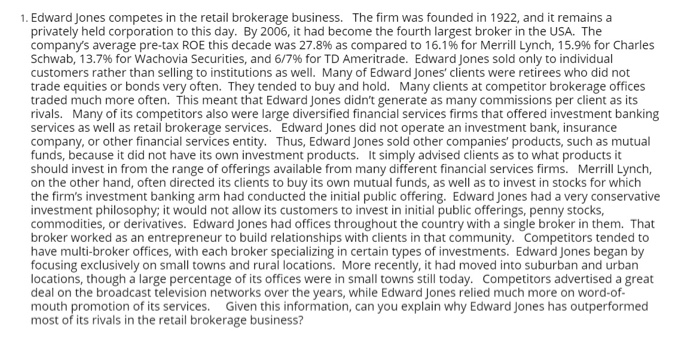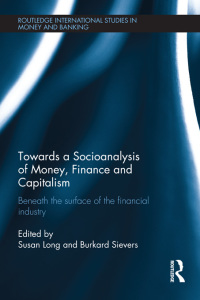n the retail brokerage business. The firm was founded in 1922. and it remains a day. By 2006, it had become the fourth largest broker in the USA. The company's average pre-tax ROE this decade was 27.8% as compared to 16.196 for Merrill Lynch, 15.9% for Charles Schwab, 13.7% for Wachovia Securities, and 6/796 for TD Ameritrade. Edward Jones sold only to individual customers rather than selling to institutions as well. Many of Edward Jones' clients were retirees who did not trade equities or bonds very often. They tended to buy and hold. Many clients at competitor brokerage offices traded much more often. This meant that Edward Jones didn't generate as many commissions per client as its rivals. Many of its competitors also were large diversified financial services firms that offered investment banking services as well as retail brokerage services. Edward Jones did not operate an investment bank, insurance company, or other financial services entity. Thus, Edward Jones sold other companies' products, such as mutual funds, because it did not have its own investment products. It simply advised clients as to what products it should invest in from the range of offerings available from many different financial services firms. Merrill Lynch, on the other hand, often directed its clients to buy its own mutual funds, as well as to invest in stocks for which the firm's investment banking arm had conducted the initial public offering. Edward Jones had a very conservative investment philosophy; it would not allow its customers to invest in initial public offerings, penny stocks, es. Edward Jones had offices throughout the country with a single broker in them. That broker worked as an entrepreneur to build relationships with clients in that community. Competitors tended to have multi-broker offices, with each broker specializing in certain types of investments. Edward Jones began by focusing exclusively on small towns and rural locations. More recently, it had moved into suburban and urban locations, though a large percentage of its offices were in small towns still today. Competitors advertised a great deal on the broadcast television networks over the years, while Edward Jones relied much more on word-of- mouth promotion of its services. Given this information, can you explain why Edward Jones has outperformed most of its rivals in the retail brokerage business







